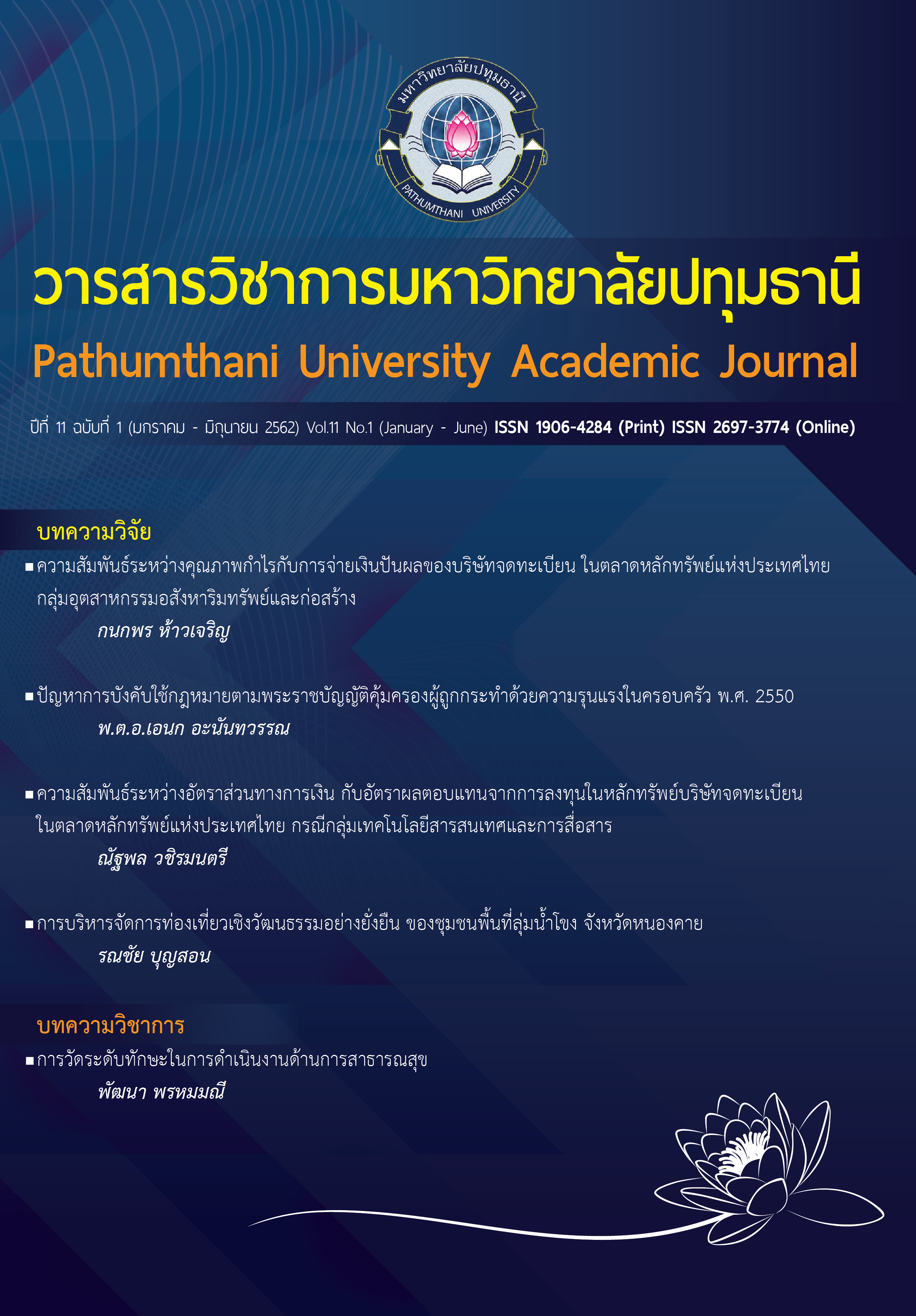Effects of Work Environment and Work Life Balance on Construction Employees' Quality of Work Life
Keywords:
สภาพแวดล้อมการทำงาน, ความสมดุลชีวิตกับการทำงาน, คุณภาพชีวิติการทำงานAbstract
This independent study aims to explore; 1) personal factors affecing on the quality of working life, 2) working environment and work-life balance influencing on the working life. Two hundred operation officers of Construction Company operated in Phra Nakhon Si Ayutthaya Province were participant in this study. The stratified random sampling method was conducted. The analytical statistics used in this study were descriptive statistics including frequency, percentage, mean, and standard deviation as well as inferential statistics including One-way ANOVA, Least Significant Difference and Multiple Linear Regression, at significance level of 0.05.
The results revealed that most of the respondents were in age range of 31-35 years old, bachelor degree, monthly income of 20,001-25,000 baht, and work experience of 1-3 years. The influential determination indicated that working environment – both physical and social - had high influence, whereas work-life balance – working, family, financial, and mind - had highest influence and, although, work-life balance in terms of working and timing had high influence.
The hypothesis testing revealed that age had effect on quality of working life in terms of safe conditions, opportunities and advances, and social recognition. Additionally, in overall, income had effect on quality of working life in term of social recognition; work experience had effect on quality of working life in terms of fair compensation and social recognition; physically and socially working environment had influence on quality of working life in overall; and work-life balance in terms of finance and mind had influence on quality of working life in overall.
References
ข้าราชการ: การศึกษาเพื่อพัฒนาเกณฑ์ มาตรฐานตัวชี้วัดคุณภาพชีวิตของข้าราชการ.
รายงานวิจัย. มปป.
ชุติมา มาลัย. (2538). ความสัมพันธ์ระหว่างปัจจัยส่วนบุคคล ความพึงพอใจในการทำงานและ
ความยึดมั่นผูกพันต่อองค์การกับการปฏิบัติตนของพยาบาลวิชาชีพโรงพยาบาลเครือสมิติเวช.
(วิทยานิพนธ์ครุศาสตร์ มหาบัณฑิต, จุฬาลงกรณ์มหาวิทยาลัย).
บุษยาณี จันทร์เจริญสุข. (2537). การรับรู้ชีวิตการทำงานกับความผูกพันองค์กร. (วิทยานิพนธ์-
ศิลปศาสตร์, มหาวิทยาลัยธรรมศาสตร์).
วรวรรณ ตอวิวัฒน์. (2555). คุณภาพชีวิตการทำงานกับความผูกพันต่อองค์การ กรณีศึกษา
ข้าราชการกรมศุลกากร ที่สังกัดส่วนกลาง (คลองเตย). (วิทยานิพนธ์รัฐประศาสนศาสตร์
มหาบณัฑิต, มหาวิทยาลัยเกริก).
วรรณา กุมารจันทร์. (2543). คุณภาพชีวิตของผู้สูงอายุในเขตภาคใต้ตอนบน. วิทยานิพนธ์
พยาบาลศาสตรมหาบัณฑิต, สาขาพยาบาลผู้สูงอายุ, บัณฑิตวิทยาลัย,
มหาวิทยาลัยเชียงใหม่.
สวรัตน์ สวธนไพบูลย์. (2548). ความพึงพอใจต่อสภาพแวดล้อมในการทำงานกับความผูกพันต่อ
องค์การของพนักงานระดับปฏิบัติการ. (วิทยานิพนธ์ศิลปะศาสตร์ มหาบัณฑิต, สถาบัน
เทคโนโลยีพระจอมเกล้าพระนครเหนือ.
สำนักงานคณะกรรมการข้าราชการพลเรือน (สำนักงาน ก.พ.) สืบค้นเมื่อวันที่ 26 กรกฎาคม 2560,
จาก https://www.ocsc.go.th/compensation
อรุณี สุมโนมหาอุดม. (2542). คุณภาพชีวิต : ศึกษาเฉพาะกรณีสํานกงานคณะกรรมการ
ข้าราชการพลเรือน. วิทยานพนธ์ศิลปศาสตรมหาบัณฑิต สาขาศิลปะศาสตร์
อุทัย หิรัญโต. (2522). หลักสูตรวิทยา. กรุงเทพฯ: โอเดียนสโตร์.
Maslow, A.H. (1954) . Motivation and Personality. New York: Harper Collins.
Merrill & Merrill (2003). Life Matter: Crating a dynamic balance of work, family, time and
money. New York: McGraw-Hall. Murphy, L.R. 1995 "Managing Job Stress and
Employee Assistance/Human Resource Management Partnership". Personnel Review.
Walton, Richard E. (1974). Improving the Quality of Work Life. Harvard Bussiness
Review, 15 (3), 33-34
Downloads
Published
How to Cite
Issue
Section
License
บทความที่ได้รับการตีพิมพ์เป็นลิขสิทธิ์ของวารสารมหาวิทยาลัยปทุมธานี
ข้อความที่ปรากฎในบทความแต่ละเรื่อง เป็นความคิดเห็นส่วนตัวของผู้เขียน กองบรรณาธิการไม่จำเป็นต้องเห็นด้วยเสมอไป และไม่มีส่วนรับผิดชอบใด ๆ ถือเป็นความรับผิดชอบของผู้เขียนแต่เพียงผู้เดียว



